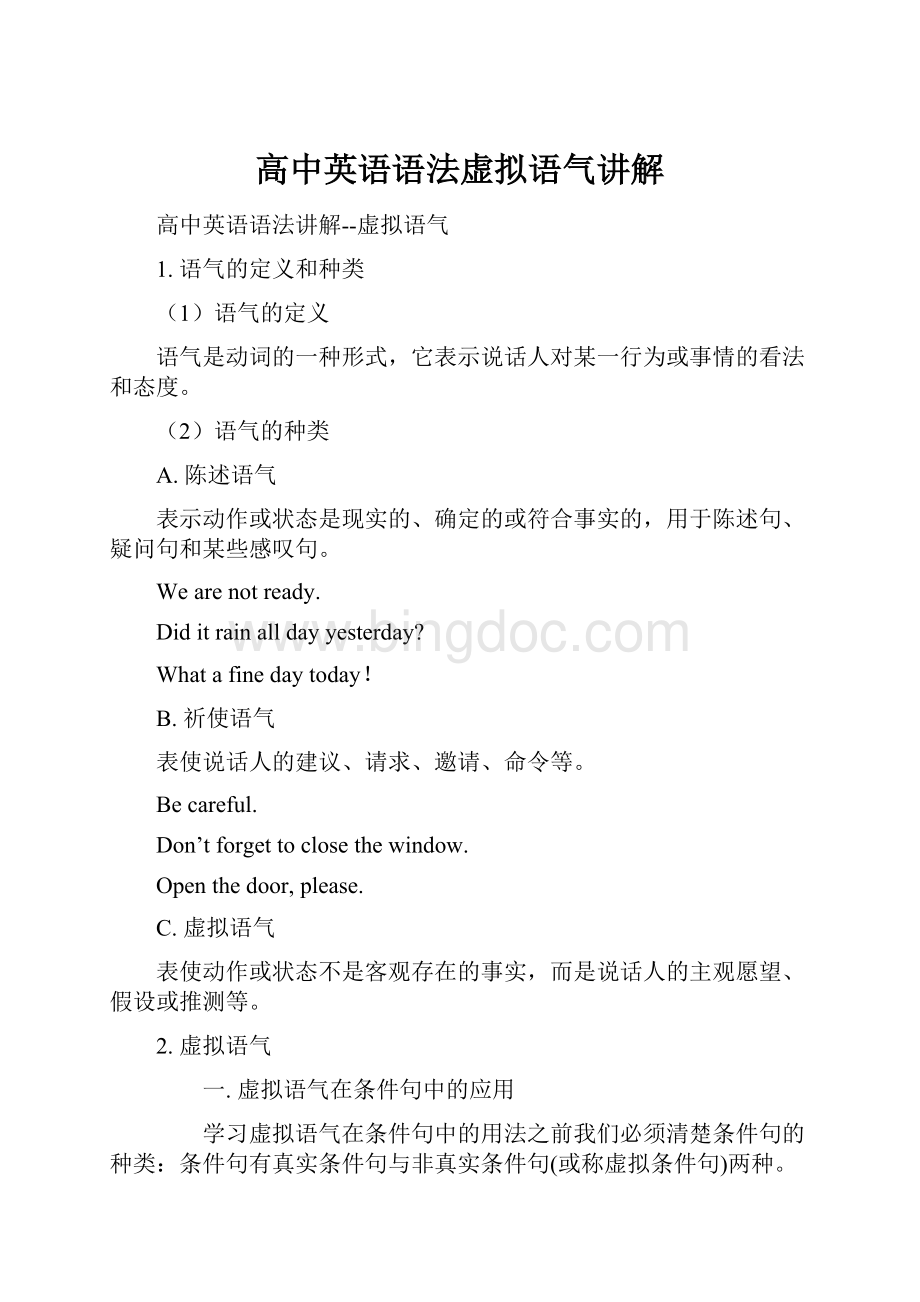高中英语语法虚拟语气讲解.docx
《高中英语语法虚拟语气讲解.docx》由会员分享,可在线阅读,更多相关《高中英语语法虚拟语气讲解.docx(22页珍藏版)》请在冰点文库上搜索。

高中英语语法虚拟语气讲解
高中英语语法讲解--虚拟语气
1.语气的定义和种类
(1)语气的定义
语气是动词的一种形式,它表示说话人对某一行为或事情的看法和态度。
(2)语气的种类
A.陈述语气
表示动作或状态是现实的、确定的或符合事实的,用于陈述句、疑问句和某些感叹句。
Wearenotready.
Diditrainalldayyesterday?
Whatafinedaytoday!
B.祈使语气
表使说话人的建议、请求、邀请、命令等。
Becareful.
Don’tforgettoclosethewindow.
Openthedoor,please.
C.虚拟语气
表使动作或状态不是客观存在的事实,而是说话人的主观愿望、假设或推测等。
2.虚拟语气
一.虚拟语气在条件句中的应用
学习虚拟语气在条件句中的用法之前我们必须清楚条件句的种类:
条件句有真实条件句与非真实条件句(或称虚拟条件句)两种。
真实条件句所表的假设是可能发生或实现的,句中的条件从句与结果主句都用陈述语气。
如:
Ifitdoesn’traintomorrow,Iwillgoforapicnic.假若明天不下雨,我就去野餐。
Oilfloatsifyoupouritonwater.你如把油倒在水里,油就浮起来。
虚拟条件句所表的假设则是不可能或不大可能发生或实现的,句中的条件从句与结果主句皆须用虚拟语气。
条件从句
主句
与现在事实相违背
过去式(动词是be用were)
should/would/could/might+动词原形
与过去事实相违背
had+过去分词
should/would/could/might+have+过去分词
与未来事实相违背
1)should+动词原形
2)were+动词不定式
3)过去式(动词是Be也可以用were)
should/would/could/might+动词原形
1.与现在事实相反的虚拟条件句,条件从句的谓语用动词的过去式(be的过去式用were),主句的谓语用should(would,might,could)+动词原形。
如:
Ifitwerenotraining,weshouldgoforapicnic.如果现在不下雨的话,我们就出去野餐了。
(事实是:
天在下雨,我们不能出去野餐。
表示愿望。
)
Ifhecamehere,hemightbeabletohelpyou.如果他来这,他就能够帮助你了。
(事实是:
他没来这,他不可能帮助你。
表示对他的良好印象。
)
2.与过去事实相反的虚拟条件句,条件从句的谓语用had+过去分词,主句的谓语用should(would,might,could)+have+过去分词。
如:
Shewouldhavegonetothepartyifshehadbeeninvited.
要是当初她被邀请的话,她就会去参加这次聚会了。
(事实是:
当时没有人邀请她,因此,她没有来参加聚会。
表示后悔。
)
Ifshehadn'tcalledme,Iwouldhaveoversleptthismorning.
今天早上,她要是不叫我的话,我就会睡过头了。
(事实是:
她今天早上叫我了,我没有睡过头。
表示感激。
)
3.与将来事实可能相反的虚拟条件句,条件从句的谓语用动词的过去式(be的过去式用were);should+动词原形;wereto+动词原形,主句用should(would,might,could)+动词原形。
如:
IfIweretobetwentyyearsoldnextyear,IwouldtakethecourseofFrench.
明年我要是二十岁,我就会学法语。
(事实是:
我现在已经老了,明年我学不了法语了。
)
Ifitshouldfail,Iwouldtryagain.要是失败了,我会再试一次。
(事实是:
有可能失败,可我会再试。
表示未知。
)
虚拟过去式有时并不表示“不大可能实现的假设”,而是表示一种希望或不希望发生的动作。
如:
Ifwecaughttheearlytrain,we’dgettherebylunchtime.
假如我们赶上早班火车,到午饭时间我们就会到达那里了。
(表希望)
Ifwemissedthetrain,weshouldhavetowaitanhouratthestation.
假如我们赶不上这班火车,我们就得在车站等一小时。
(表不希望)
4.混合型的条件句
当条件从句与主句所表的时间不一致时,虚拟语气的形式应作相应的调整。
主句和从句的谓语动词并不相互呼应,这种条件句叫混合条件句。
较多见的混合型条件句是从句用过去完成时(指过去行为),而主句用一般时(指目前状态)。
Hewouldpassthetestifhehadtakenmyadvice.如果他听了我的劝告,他现在会通过考试。
IfIhadspokentohimyesterday,Ishouldknowwhattodonow.
假如昨天我对他说了,现在我就知道该怎么办了。
Youwouldbemuchbetternowifyouhadtakenmyadvice.
假如你接受了我的意见,你现在就会好得多。
如条件从句用ifIwere...,主句则可用表任何时间的虚拟形式。
如:
IfIwerenotbusy,Iwouldhavecome.
假如我不忙,我就会去了。
(were表过去)
IfIwereyou,Iwouldgo.
假如我是你,我会去的。
(were表现在)
二.连词if的省略(倒装)
如果虚拟条件句的谓语部分有were,had和should时,可省略if,把were,had和should放到从句主语前面去,多见于书面语。
Hadyounothelpedme,Ishouldhavefailed.要是没有你的帮助,我就失败了。
Wereyouinmyposition,youwoulddothesame.假如你处在我的地位,你也会这样干的。
Shouldtheyattackus,we’llwipethemoutcompletely.
假如他们进攻我们,我们就把他们彻底消灭干净。
例:
1._________hewouldhavesucceededintheexamination.
A.Hadheworkedhard
B.Ifheworkedhard
C.Ifheworkshard
D.Ifhehasworkedhard
2._______itraintomorrow,wewouldstayathome.
A.ShouldB.BeC.WereD.Will
3._______,hewouldteachushowtosolvetheproblem.
A.WerehehereB.Washehere
C.IfheisD.Ishehere
4._________,weshouldbeglad.
A.Weretheytoarrivetomorrow
B.Theyweretoarrivetomorrow
C.Theywouldarrivetomorrow
D.Theyarrivetomorrow
5._______theclouds,youwouldfindtheairplaneintheskyeasily.
A.WereitnotforB.Ifithadnotbeenfor
C.IfitwerenotD.Haditnotbeenfor
答案:
1—5AAAAA
三.含蓄条件句
虚拟条件句中的条件从句有时不表出来,只暗含在上下文中,这种句子叫做含蓄条件句。
含蓄条件句大体有三种情况。
1)条件暗含在短语中。
如:
Butforyourhelpwecouldn’thavesucceededintheexperiment.
如果没有你的帮助,我们的实验是不会成功的。
(暗含在分词短词butforyourhelp)
WhatwouldIhavedonewithoutyou?
如没有你,我会怎么办呢?
(条件暗含在介词短语withoutyou中)
Itwouldbeeasiertodoitthisway.这样做会比较容易。
(条件暗含在不定式短语todoitthisway中)
Thissamething,happeninginwartime,amounttodisaster.
同样的事,如发生在战时,就会酿成大祸。
(条件暗含在分词短语happeninginwartime中)
Hemusthavethestrengthofahippopotamus,orhenevercouldhavevanquishedthatgreatbeast.他一定是力大如河马,否则他绝不会击败那只庞大的野兽。
(暗含条件是连词or)
Alone,hewouldhavebeenterrified.如是单独一人,他是会感到害怕的。
(暗含条件是alone)
2)条件暗含在上下文中。
如:
Youmightstayhereforever.你可以永远待在这儿。
(可能暗含ifyouwantedto)
Wewouldhavesucceeded.我们本来是会成功的。
(可能暗含ifwehadkepttrying)
Yourreputationwouldberuined.你的名誉会败坏的。
(可能暗含ifyoushouldacceptit)
3)在不少情况下,虚拟式已变成习惯说法,很难找出其暗含的条件。
如:
Youwouldn’tknow.你不会知道。
Iwouldliketocome.我愿意来。
四.不用if引导的条件从句
虚拟条件句中的条件从句除用if引外,还可用when,unless,lest,suppose,asif,forfear,incase,oncondition等词语来引导。
如:
Thepeasantspreparedtofeedthecitywhenitshouldbefreed.
农民已准备在这座城市解放后供给粮食。
Lestyoushouldnothaveheardall,Ishallbeginatthebeginning.
我怕你没有听全,所以我再从头开始讲一遍。
UnlessIwerewell,Iwouldn’tbeatschool.除非我好了,否则我不会上学。
SupposeyouweregivenachancetostudyinAmerica,wouldyouaccept?
假如给你一个到美国学习的机会,你会接受吗?
(suppose或supposing=whatif)
Supposingitwereso?
(=Supposingitwereso,whatwouldhappen?
)
要是这样的话,会怎么样呢?
Hecanusethebicycleonconditionthatheshouldreturnittomorrow.
如果明天能还回来,他就可以借用这辆自行车。
IncaseIforget,pleaseremindmeofmypromise如果我忘了,请提醒我的诺言。
Susaniswalkingslowly,asifsheweretired.苏珊走得很慢,就像是累了似的。
与if一样,上述词语所引导的条件从句亦可用直陈语气,表可能实现或发生的事。
虚拟语气补充讲解(第二课时)
虚拟语气除主要用于条件句(也就是状语从句)外,还可用于主语从句、宾语从句、表语从句、定语从句等。
1.虚拟语气在主语从句中的应用
“常用在Itis(was)+形容词/过去分词+that引导的主语从句”的句型中的主语从句要用虚拟语气。
主语从句的谓语用should+动词原形(或should+have+过去分词)或只用动词原形(尤其是美国英语)。
should在此是助动词,本身并无实义,这种主语从句中的should有时有感情色彩。
It'simportantthatwe(should)workoutaplan.(带有“要求”的含义)
It'sbetterthathegoatonce.(带有“建议”的意思)
☆用于本句型的形容词并不多,常见形容词有:
necessary,important,best,right,impossible,preferable,desirable,imperative,advisable,essential,reserved,urgent,等。
Itisnecessarythathe(should)besentthereatonce.
It'sstrangethatheshouldsayso.
Iwasgladthatheshouldgo.
Itisimportantthatweshouldspeakpolitely.
Itisapitythatsheshouldfaresobadly.
It'srightthatyoushouldthinkthatway.
☆用于本句型中的过去分词就是表示提议要求、命令等动词的过去分词,如suggested,settled,required,requested,demanded,urged,decided,proposed,ordered,desired,advised等。
ItisrequestedthatProfessorLiu(should)giveusalecture.
Itisdesiredthatwe(should)geteverythingreadybytonight.
I’mashamedyoushouldhavedonesuchathing.
Ithasbeensuggestedthatthemeeting(should)beputoff.有人建议推迟会议。
Itissettledthatyouleaveus,then?
注意:
这种句型中的主语从句也可用陈述语气,如:
Itwasimportantthathemadeanexplicitstatementonthisscorelastweek.他上个星期对于这一方面做了明确的说明,这是很重要的。
句型总结:
Itisnecessarythat…
Itisimportantthat…
Itisnaturalthat…
Itisstrangethat…
Itissurprisingthat…
Itisimpossiblethat…
Itisgreatpitythat…
Itwillbebetterthat…
Itissuggestedthat…
Itisorderedthat….
Itisdemandedthat…
2.虚拟语气在宾语从句中的应用
1).宾语从句在表示提议、要求、命令、意志等动词后,其谓语用should+动词原形或只用动词原形的虚拟语气,作为suggest,request,demand,urge,propose,prefer,advise,insist,require,order,command,maintain,ask,object,arrange,desire等动词的宾语。
如:
Thedoctorsuggestedthathenotgothere.医生建议他不要去那里。
Hesuggestedthatweshouldleaveearly.他建议我们早点动身。
Thejudgeorderedthattheprisonershouldberemanded.法官命令被告还押。
例:
1.Theteacherinsistedthateverystudent_______everyotherline.
A.writesB.writeC.wouldwriteD.wrote
2.Jack’sfatherinsists______inthishotel.
A.notstayingBnottostay
C.thathenotstayD.stayingnot
3.Theyinsistedthatyou_______themaquickanswer.
A.shouldgiveB.gave
C.mustgiveD.wouldgive
4.Theguardatthegateinsistedthateverybody_______therules.
A.obeysB.obeyC.willobeyD.wouldobey
答案:
1—4BCAB
注:
1)、suggest为“建议去做…;命令…”从句用should+do
为“说明;暗示”,从句用过去时或过去完成时。
1.ThedoctorsuggestedthatIshouldtakethemedicinethreetimesaday.
2.Thedoctorsuggestedthatmygrandmotherhadcaughtabadcold.
3.Theexpressiononherfacesuggeststhatsheknewthesecret.
4.Theysuggestedthatthesebooks______atonce.
A.shouldtakeaway
B.wouldbetakenaway
C.betakenaway
D.takeaway
5.Isuggestedameeting_______todiscussthematter.
A.willbeheldB.wouldbeheld
C.shouldholdD.beheld
6.Hissilenceatthemeetingsuggested________toyourplan.
A.didn’tagreeB.hadn’tagreed
C.wouldn’tagreeD.shouldn’tagree
答案:
4—6CDA
2)、insist“坚持要去做…,坚持应该去做”,从句用should+do
为“坚持表明,坚持说/解释”,从句用过去时或过去完成时。
1.Sheinsistedthatshe______illofhimbehindhim,buthedidn’tbelieve.
A.hadn’tspokenB.shouldn’tspeak
C.wouldn’tspeakD.notspeak
2.Heinsistedthatwe______theboytohospital.
A.takeB.tookC.wouldtakeD.willtake
3.Heinsistedthathe_______ourcar.
A.shouldstealB.wouldsteal
C.hadn’tstolenD.steal
4.Theteachercommandedthatallhisstudents______theirhomeworkafterclass.
A.wouldhandinB.shouldhandin
C.handedinD.mighthandin
5.Theworkersrequestedthattheirworkingconditions______.
A.mustbeimprovedB.beimproved
C.wouldbeimprovedD.wereimproved
6.Theyrequiredthatthecrops_______harvestedatonce.
A.shouldbeB.be
C.areD.mustbe
答案:
1—6BACBBA
2).wish的宾语的从句,表示愿望,常省去连词that。
☆从句的谓语动词可用过去式,表示现在的愿望(与现在事实相反),虽实现的可能性不大,但仍有实现的可能。
Iwishitweretrue.我但愿这是真的。
☆从句的谓语动词还可用“could(would,might)+动词原形”用来表示将来的愿望
Iwishyouwouldstayalittlelonger.我希望你再待一会儿。
☆表示无能为力的过去愿望(与过去事实相反),可用“had+过去分词”或“could(would,might)+have+过去分词”
Iwishyouhadcalledyesterday.我希望你昨天来过电话。
WewishyouhadcometoourNewYear’sparty.我们真希望你来参加了我们的新年联欢会。
例:
7.IwishI_______youyesterday.
A.sawB.dids